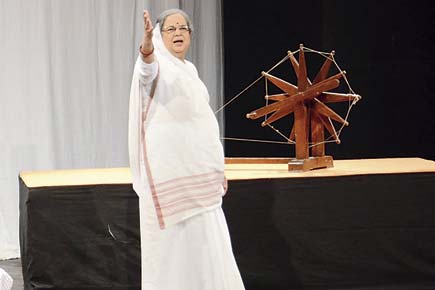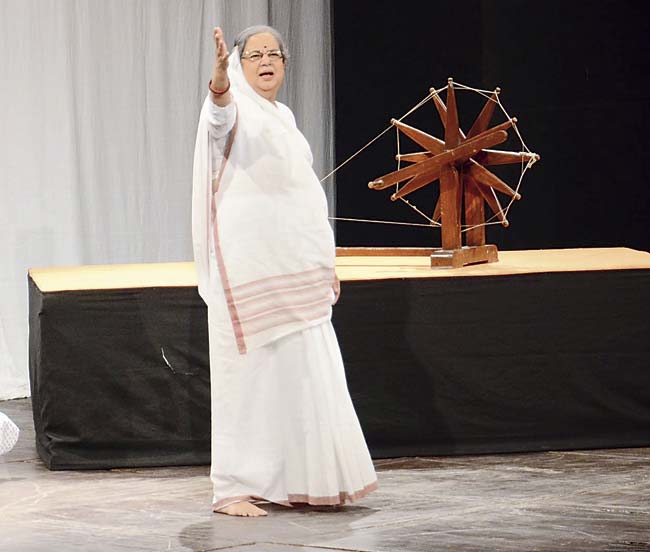Jagadamba is a play about Kasturba Gandhi, written by Ramdas Bhatkal, which has been performed in the original Marathi by Rohini Hattangady, who, it may be remembered, immortalised the character on screen in Richard Attenborough’s film Gandhi

 Jagadamba is a play about Kasturba Gandhi, written by Ramdas Bhatkal, which has been performed in the original Marathi by Rohini Hattangady, who, it may be remembered, immortalised the character on screen in Richard Attenborough’s film Gandhi.
Jagadamba is a play about Kasturba Gandhi, written by Ramdas Bhatkal, which has been performed in the original Marathi by Rohini Hattangady, who, it may be remembered, immortalised the character on screen in Richard Attenborough’s film Gandhi.
An English version of the play was recently staged in Mumbai, enacted by Yashodhara Deshpande Maitra. The play has all the known highlights of her life with Mahatma Gandhi, and she comes across as a loyal wife and immensely courageous woman. But seen from the perspective of the twenty-first century, when many women are achievers in their own right, where does one place the woman who is revered just as the wife of a great man?
ADVERTISEMENT

Yashodhara Deshpande Maitra plays the role of Kasturba Gandhi in the English version of the one-act play, Jagadamba at NCPA
Kasturba Kapadia was married to Mohandas Gandhi when she was thirteen an arranged marriage, as was the custom of the times. He was the same age as her, but he had the benefit of an education in India and later, in the UK, while she remained unlettered most of her life. When he want to London to study law, she stayed behind, already a mother to Harilal, who was to go on to become a rebel and cause untold grief to his parents the story has been told in a play Gandhi Viruddh Gandhi, which was also the subject of a film, Mahatma Versus Gandhi.
After Gandhi moved to South Africa to practice law, she went there to be with her husband. In this she was different from the many traditional Indian wives, whose husbands left their hometowns for work, leaving their wives and children behind. The wives took on the responsibility of looking after their in-laws and raised children on their own. They had no choice, and if they managed to go against social norms, they lost the respect accorded to a married woman, even one who did not have her husband by her side.
From all accounts, Kasturba was a remarkable woman, and stood by her husband when he was immersed in political activism, first in South Africa and then in India. But then, it was Gandhi who was all for the emancipation of women; he made Kasturba participate in his political battles, so that other women would come forward too without fear or shame. During the 1913 protests against working conditions for Indians in South Africa, Kasturba was arrested and sentenced to three months of hard labour in prison When she came out she was weak and emaciated — Gandhi patiently nursed her back to health. It was he who was strangely tyrannical and tender at the same time if he asked her to get out of his house when she refused to touch the chamber pot of a guest, he also helped deliver their son, Devdas. When the doctors asked her to give up salt and pulses for health reasons, he gave them up too.
He imposed his will on her all the time, but also admired her strength. He wrote about her, “We were a couple outside the ordinary. It was in 1906 that by mutual consent and after unconscious trials, we definitely adopted self-restraint as a rule of life. To my great joy this knit us together as never before. We ceased to be two different entities without my wishing it; she chose to lose herself in me. The result was she became truly my better half. She was a woman always of very strong will which, in our early days I used to mistake for obstinacy. But that strong will enabled her to become, quite unwittingly, my teacher in the art and practice of non-violent non-cooperation.”
It is difficult to shake off thoughts about what she would have achieved if she had not been Gandhi’s wife, and if he had not encouraged her. Very little is known about the wives of other leaders like Sardar Patel or Maulana Azad and hardly anything about Kamla Nehru though she too participated in the freedom movement; not surprisingly, next to nothing is known about the husbands of prominent female leaders of the time, like Sarojini Naidu, or later, Indira Gandhi.
In our culture, a wife sacrificing her own comforts and following her husband into the wilderness is institutionalised in the epics and mythology. Sita went with Ram to the forest when he was banished from Ayodhya, so she is the ideal wife and her name is forever linked to Ram’s. Laxman’s wife who stayed behind in the palace is hardly ever mentioned, though her life could not have been easy, being away from her husband for fourteen years. Urmila wanted to accompany Laxman, but he wanted to devote himself to caring for Ram and Sita. Folklore has it that Laxman swore not to sleep for fourteen years, so that his attention to his brother and sister-in-law would not waver; the Goddess of Sleep made Urmila take on the duty of sleeping on her husband’s behalf for all those years. Her being asleep was probably symbolic of her life without Laxman. Her sacrifice was no less severe, but because she was not by her husband’s side, glory passed her by too.
Deepa Gahlot is an award-winning film and theatre critic and an arts administrator. She tweets at @deepagahlot
 Subscribe today by clicking the link and stay updated with the latest news!" Click here!
Subscribe today by clicking the link and stay updated with the latest news!" Click here!







